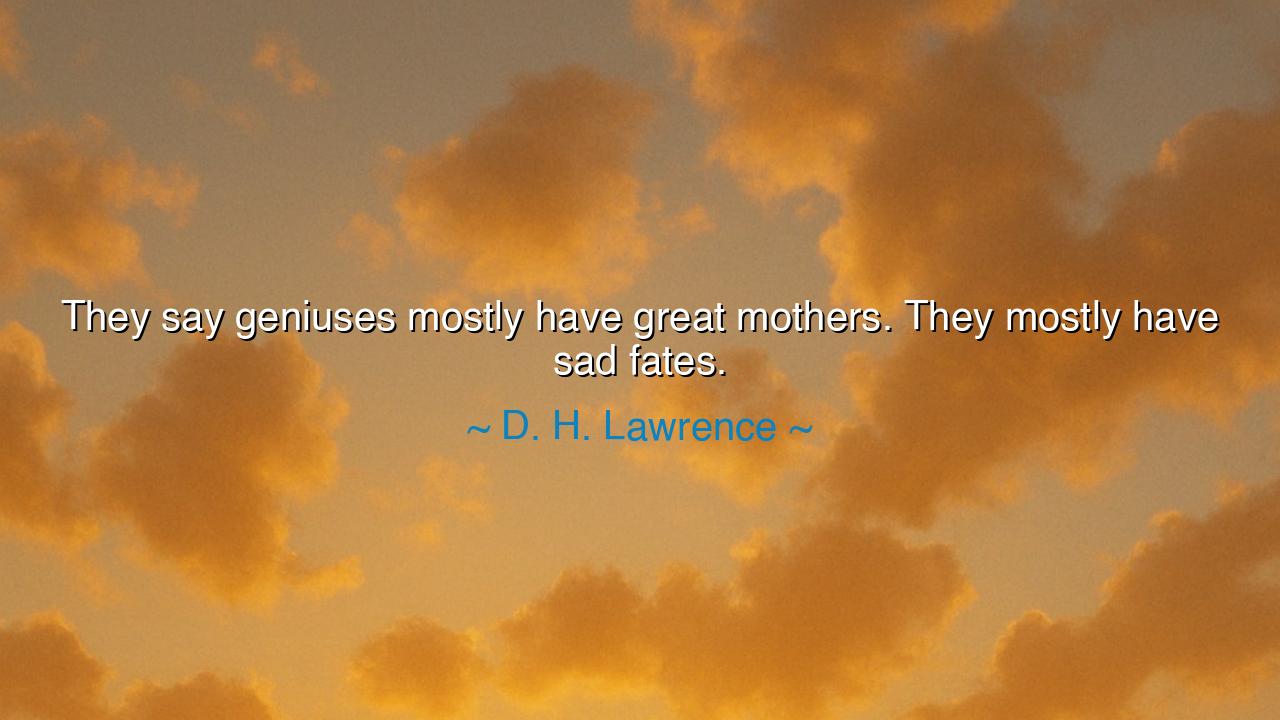
They say geniuses mostly have great mothers. They mostly have sad






When D. H. Lawrence wrote, “They say geniuses mostly have great mothers. They mostly have sad fates,” he was not merely describing a pattern of history — he was unveiling the mysterious bond between creation, love, and sorrow. In his words lies a quiet reverence for the maternal spirit, that divine force which shapes the genius from birth, yet also a sorrowful recognition that those touched by greatness are often marked by loneliness and tragedy. Lawrence, who himself was profoundly influenced by his mother’s devotion and intellect, understood that genius is not born from comfort, but from intensity — of love, of struggle, of longing. The great mother gives life twice: first to the body, and then to the mind. But the cost of that second birth is often the burden of difference — the genius’s exile from ordinary joy.
The ancients would have understood this truth well. For in every age, the gift of exceptional insight has carried with it the curse of isolation. The goddess Demeter, mother of Persephone, loved her child so fiercely that her loss brought famine upon the earth. In her anguish and wisdom, she mirrors the mothers of the gifted — women whose love ignites the fire of greatness but cannot protect their children from its consuming flame. The great mother gives her child vision, yet that vision often sees too much — too much of beauty, too much of pain. And so the genius, born of immense love, walks forever between heaven and earth, unable to rest in either.
Lawrence’s own life gives weight to his reflection. His mother, Lydia Lawrence, was a refined and passionate woman who nurtured his mind while shielding him from the coarser world of his mining-town upbringing. Her encouragement gave birth to his imagination, but her death shattered his heart. From that loss grew his restless art — his fierce explorations of human desire, of freedom, of the divine within flesh. The sad fate of the genius, then, is not always destruction, but restlessness without peace, the endless search for meaning in a world too small for their vision. For those who feel too deeply, even joy burns.
Throughout history, we see this same pattern repeating like an ancient song. Beethoven, guided by a mother whose gentleness was his only refuge from a tyrannical father, grew to express the voice of eternity through sound — yet died alone, deaf, misunderstood. Vincent van Gogh, whose mother’s early affection and moral strength shaped his soul, poured his anguish into color, painting the invisible beauty of existence, but could not bear the silence of the world’s indifference. Their mothers gave them wings of perception, yet those wings carried them into storms. The gift and the grief were intertwined, inseparable as light and shadow.
Lawrence’s insight also touches on something spiritual — that genius, by its nature, is born of deep sensitivity, and sensitivity is both a blessing and a wound. The great mother cultivates that sensitivity, seeing not weakness but sacred fire. She does not harden her child against the world; she opens them to it. But the world is rarely kind to the open-hearted. To feel more, to think more, to dream more — these are divine gifts that often meet with human misunderstanding. Thus, the fate of the genius is to suffer the gap between vision and reality, to love a world that does not yet exist.
And yet, we must not despair at this truth. For though their fates are sad, the legacy of such souls is luminous. The mothers who raise them plant seeds that outlive the flesh — art, philosophy, invention, compassion. Through their suffering, geniuses expand the boundaries of what humanity can feel and understand. Their sorrow becomes our wisdom; their solitude becomes our song. The great mother and the tragic genius are, in truth, two halves of a sacred cycle — one creates, the other transforms.
The lesson, therefore, is not to fear sorrow, but to see in it the depth of one’s purpose. If you are a parent, nurture not just the talent of your child, but their spirit’s resilience. Teach them that greatness is not measured by triumph alone, but by endurance in the face of struggle. And if you are one who feels the mark of genius — restless, misunderstood, alone — remember that your suffering is not in vain. It is the echo of a mother’s love that set your heart ablaze with vision.
So let us honor both halves of Lawrence’s truth: the great mothers, whose faith creates worlds, and the sad fates, whose struggles give those worlds meaning. For without love, genius cannot begin — and without sorrow, it cannot become eternal.






AAdministratorAdministrator
Welcome, honored guests. Please leave a comment, we will respond soon